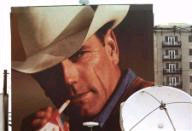Smoking cowboy most influential imaginary icon
(Reuters)
Updated: 2006-10-18 08:27 NEW YORK - They influence
everything from how we look and act to eat and speak and have even helped  sway the course of history -- but they are not real. sway the course of history -- but they are not real.
And topping a list of "The 101 most influential people who never lived" in a
book released on Tuesday is the Marlboro Man -- a macho American cowboy who
emerged in the 1950s and helped boost sales of Marlboro cigarettes.
"The figments of our imaginations, the creatures we push out of our minds
into the real world are fully capable of pushing back with surprising
consequences," Jeremy Salter, one of the U.S. book's three authors, told
Reuters.
Coming in at number two on the list is Big Brother of George Orwell's 1984,
followed by King Arthur, who the authors say embodies for many the ideal
monarch, and Santa Claus comes in at number four.
"Santa Claus governs our entire economy for the last quarter of the year and
without him businesses would go broke," said co-author Allan Lazar.
Barbie "the bodacious plastic babe who became a role model for millions of
little girls, setting an impossible standard for beauty and style" makes the
list at number 43.
But Rosie the Riveter, the buff, blue-collar factory worker who the authors
say helped jump-start the women's liberation movement comes in at 28.
"The idea came to us that influential characters didn't have to exist, that
fictional characters were just as important in our lives, even in maybe some
cases more so than real people," Lazar said.
Even the Loch Ness Monster makes the list at number 56.
"As the most popular tourist attraction in Scotland, Nessie's influence on
the cash flow of that country has been significant," wrote the authors of "The
101 most influential people who never lived."
At 101 was Paul Bunyan, a mythical lumberjack who the authors say was created
by U.S. lumberjacks during the 1800s "to bring some good cheer, and esteem into
their lives of drudgery."
|